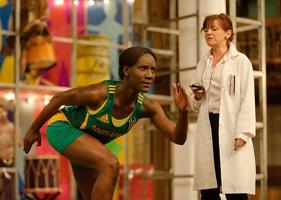Review - 'The Lightning Child' at Shakespeare's Globe Theatre 2013
Billed as the Globe's first musical, Ché Walker and Arthur Darvill's show does indeed have songs, but along the continuum of formats for musical theatre, this is at that end of the scale where songs are sparse rather than dominating the action. And that makes pretty good sense given that there is more than enough to test audiences in the plot, without encapsulating it entirely in songs. Music, of course, is hardly a stranger to this venue, and we get to see a startling array of instruments, some of which seem almost ludicrously impossible to play. Not here, though. Arthur Darvill's work is delivered via guitars, piano and masses of percussion instruments, many of them played by members of the cast.
'The Lightning Child' is based on Euripides' tragedy 'The Bacchae' which was first performed after the author's death some 400 years before the birth of Christ. It focuses on Dionysus, the god of wine, parties, drugs, madness, chaos and, it seems, much else besides. That gives a modern author plenty of scope in the creativity department to do almost anything, and Ché Walker does not hesitate to stamp his own interpretation on this ancient story. So, the show begins not in Greece or on Mount Olympus even, but in America in the 1960s where we find Neil Armstrong donning his spacesuit ready for his epic trip to the moon, and being pestered by his wife to give up his ambitions of venturing to unknown quarters of space and remain in the comfortable strictures of civilised society. Mr Armstrong duly rejects his wife's pleas, and lands on the moon to discover there really IS a man in it. Well, not a man so much but a kind of sidekick of the gods, called the Ladyboy Herald (Jonathan Chambers) and dressed as though he has just come hot-foot from a performance of Aladdin. The Herald provides a useful device to narrate the rest of the twisting tale. In what follows we not only get a good dose of Euripides' original plot, but we also see 'plays' (as the Herald describes them) giving us a glimpse into the lives of people in the present-day such as two northern men who are 'driven mad by smack' and who seek solace in caring for a dog called 'Cleopatra', and a young woman who is a gifted string player but has her hands summarily hammered by her jealous flatmate. We also meet Caster Semenya - the female athlete who had to endure a medical test when her running led to her gender being questioned. And we also get to meet Billy Holliday and Lester Young making-up in a dressing room after a long-standing falling-out. So, something of a roller-coaster ride, here.
Essentially, 'The Lightning Child' is a kind of comic, almost fantastical romp which has many endearing qualities and provides considerable humour and fun thanks to Ché Walker's engaging and inventive script. Arthur Darvil's eclectic and suitably energetic musical style appropriately accentuates the narrative rather than continually force-feeding us with endless lyrics and sound. But I doubt that anyone went home humming any of the songs, and the singing is relatively uninspiring.
A warning on the Globe's website states the "production contains filthy language, strong content and violence", and indeed it does. There were more than a few gasps from members of the yard when the violinist had her hands smashed, and also when Pentheus was decapitated. On the whole, though, it is hard not to get drawn-in by the likes of Jonathan Chambers' off-beat Ladyboy Herald who calls us 'peeps', and Clifford Samuel's excessively vain Pentheus who seems more concerned with his six-pack than anything else, even going so far as to give the audience the chance to touch it. Bette Bourne makes another Globe appearance as the blind prophet Teiresias dressed from head to foot in glittering gold, and spouting a considerable amount of the 'filthy language' we are warned of. On the other hand, this is an overly long venture that could do with a severe, but judicial pruning, and I began to feel insulted when Tommy Coleman's playful Dionysus started instructing us on the meaning of the story - much better, I think, to let us work it all out for ourselves, even if it might take a bit of brain-cranking to do so. And I found the ending desperately twee, even though I could detect some creatively purposeful consideration in it. In spite of those reservations, though, it is really hard not to like this mélange of the mythical and modern.
"It's rude, crude, bold and boisterous...The mistake is to downplay the focus on the tension between the life-affirming allure of Dionysus and the puritanical repression of Pentheus, and instead make continuous narrative digressions...A punishing evening that shows its excess in a running time close to three hours. The Globe's Season of Plenty reaches its conclusion with a failure to recognise that less can be so much more. "
Lyn Gardner for The Guardian
"Even if it feels like a damp squib by the end, it certainly won me over for while."
Kate Bassett for Arts Desk
"One of the worst evenings of the theatrical year...The impact of the original myth is entirely dissipated, not to mention sullied by Bette Bourne's dreadful Teiresias constantly stating, "Thank f**k I'm blind". Darvill's ethereal music adds little to Matthew Dunster's ragged production. "This is torture", screams Agave (Finty Williams) at the end. We know precisely what she's going through."
Fiona Mountford for The Evening Standard
"A poor man's Hair with far less memorable music. But unlike Hair's "Harmony and understanding, sympathy and trust abounding," it's a frequently confusing portrait of disharmony and distrust that abounds here."
Mark Shenton for The Stage
External links to full reviews from popular press
Guardian -
Originally published on
